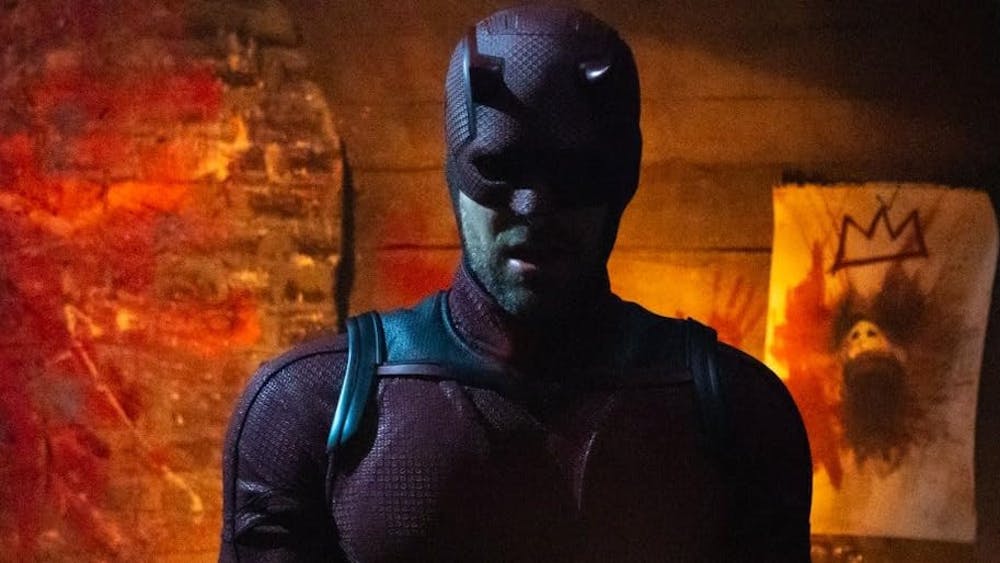Review: ‘Daredevil: Born Again’ struggles with identity but shows promise

Score: ★★★½
Following Netflix’s acclaimed third season of "Daredevil," expectations were understandably high for Marvel’s new Disney+ continuation, "Daredevil: Born Again." Unfortunately, the series suffers noticeably from a split personality, caught between excellence and confused mediocrity.
"Born Again," developed by showrunners Dario Scardapane, Matt Corman and Chris Ord, attempts to bridge Marvel’s darker Netflix universe with the broader Marvel Cinematic Universe. Reports revealed that the initial Disney+ version of the series had to be scrapped and substantially revised halfway through production, resulting in a chaotic final product. Yet, every season of “Daredevil” produced at Netflix had similar problems, so I remained hopeful. This hope grew, especially when new showrunners Justin Benson and Aaron Moorhead, who previously worked on "Loki," arguably Disney+’s strongest Marvel production, became lead directors.
Unfortunately, there is no doubt that season one suffered from a troubled production history. The first episode begins promisingly, establishing a distinct visual tone that, while different from Netflix’s "Daredevil," still feels authentically passionate. The aspect ratio shifts dramatically during Matt Murdock’s (Charlie Cox) first fight scene, and it’s genuinely thrilling. This is “Daredevil” at its best: visually compelling, emotionally charged and relentless.
But just as quickly as excitement builds, episode two introduces a jarring tonal shift that lasts until episode seven. Clearly, the remnants of the series' initial production attempt — a lighter, episodic MCU-style adventure — clash awkwardly with the darker narrative set up by the first episode. Episodes two through seven largely sideline Daredevil’s identity as Matt tackles trivial side missions alongside characters who feel entirely disconnected from his well-established narrative. This batch feels more akin to typical Disney+ fare, with lower stakes, forced comedic beats and distracting MCU references.
One particularly glaring example involves Matt spending an episode teamed up with Ms. Marvel’s father, whose repeated name-dropping feels painfully forced. Such moments undermine the seriousness of Daredevil’s universe, diluting the tension that makes the character compelling.
A significant disappointment came from the show’s handling of side characters, most notably the villain Muse. After hearing considerable praise for Muse from comic readers, I explored the comics myself and found him extremely engaging. However, the show's interpretation severely weakens his impact, turning a compelling antagonist into an underwhelming afterthought. This troubling trend extends throughout the show, with many new characters feeling incomplete and failing to justify their screen time.
Moreover, separating Matt from key supporting characters — Foggy Nelson, Karen Page and The Punisher — proves detrimental. The newly introduced characters, notably Matt’s uninspired romantic interest, fail to resonate emotionally. Without meaningful connections, Matt’s storyline feels aimless for much of the series, robbing viewers of emotional investment.
Yet, just when frustration peaks, episodes eight and nine arrive as a dramatic rescue mission. Benson and Moorhead reclaim the narrative, reestablishing the darker, grittier tone fans appreciate. These episodes directly confront Matt’s internal struggles and moral ambiguity, and feature standout action sequences that feel authentically "Daredevil." Charlie Cox once again demonstrates exceptional skill, masterfully encapsulating Matt Murdock’s complex internal conflicts. Jon Bernthal’s Punisher, though underused, remains captivating whenever on screen. Vincent D'Onofrio's portrayal of Wilson Fisk remains another highlight, keeping viewers glued to the screen whenever he appears.
While the showrunners clearly tried to reconcile contrasting visions, this season undeniably feels like two different projects forcibly combined — casual and gritty narratives clashing awkwardly. That said, I genuinely enjoyed some of the "filler" episodes showcasing a superhero navigating heroics without his mask, offering rare, engaging moments of depth and humanity.
Despite these significant shortcomings, "Daredevil: Born Again" shows immense potential for its confirmed second season. With Benson and Moorhead now fully at the helm, there's reason for optimism. The groundwork laid in episodes one, eight and nine demonstrates the genuine promise of a properly executed "Daredevil" series within the MCU.
Yet, potential alone doesn't rectify the messy experience of season one. "Daredevil: Born Again" serves as a frustrating but intriguing stepping stone. Its unevenness is hard to ignore, but the glimpses of brilliance give hope for a brighter future for Hell’s Kitchen’s guardian devil.
More from The Rice Thresher

“You need a therapist, not a keyboard”: Loretta Ross on calling in
Loretta Ross jokes that she can “talk as long as Fidel Castro.” These days, her urgency is reserved for speaking against the 'call out' — the act of public shaming as a corrective measure — which she said has become as "inevitable as gravity” during her lecture at Duncan Hall on April 14.

Rob Kimbro returns to Rice, focusing on ‘stories that matter’
When Rob Kimbro graduated from Rice University in 1995, he said he envisioned a career in the United States Foreign Service. Now, nearly three decades later, he returns as a full-time lecturer in the theatre program having established himself in Houston’s theater community and as a mentor to Rice students.

Review: “Sinners” is Hollywood filmmaking at its finest
Oftentimes, film critics (myself very much included) exaggerate the death of cinema as we groan about the dominance of intellectual property, when in actuality, many good, unique films constantly surround us. 2025 has been an excellent reminder of this; for every “Captain America,” there’s a “Black Bag.”

Please note All comments are eligible for publication by The Rice Thresher.